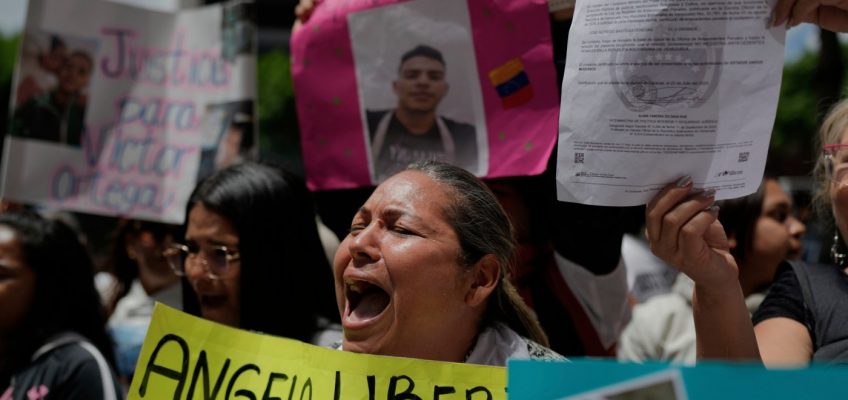By NICHOLAS RICCARDI, Associated Press
The American Civil Liberties Union on Friday asked two federal judges to order the Trump administration not to deport any Venezuelans held in northern Texas under an 18th century wartime law, contending that immigration authorities appeared to be moving to restart removals despite the U.S. Supreme Court’s restrictions on how it can use the act.
The group has already sued to block deportations under the Alien Enemies Act of 1798 of two Venezuelans held in the Bluebonnet Detention Center and is asking a judge to issue an order barring removals of any immigrants in the region under the law. In an emergency filing early Friday, the ACLU warned that immigration authorities were accusing other Venezuelan men held there of being members of the Tren de Aragua gang that would make them subject to President Donald Trump’s use of the act.
The act has only been invoked three previous times in U.S. history, most recently during World War II to hold Japanese-American civilians in internment camps. The Trump administration contended it gave them power to swiftly remove immigrants they identified as members of the gang, regardless of their immigration status.
Related Articles
Trump to invoke Schedule F to make it easier to fire some federal workers
Trump turns a COVID information website into a promotion page for the lab leak theory
IRS whistleblower on Hunter Biden is out as acting commissioner just days after getting the job
Video shows doctor with measles treating kids. RFK Jr later praised him as an ‘extraordinary’ healer
Maryland senator is returning to US after pushing for Abrego Garcia’s release and meeting with him
The ACLU and the group Democracy Forward sued to halt deportations under the act. The U.S. Supreme Court allowed deportations to resume, but ruled unanimously they could proceed only if those about to be removed had a chance to argue their case in court and were given “a reasonable time” to contest their pending removals.
Federal judges in Colorado, New York and southern Texas promptly issued orders barring removal of detainees under the AEA until the administration provides a process for them to make claims in court. But there’s been no such order issued in the area of Texas that covers Bluebonnet, which is located 24 miles north of the city of Abilene in the far northern end of the state.
District Judge James Wesley Hendrix this week declined to bar the administration from removing the two men identified in the ACLU lawsuit because ICE filed sworn declarations that they would not be immediately deported.
But the ACLU’s Friday filing includes sworn declarations from three separate immigration lawyers who said their clients in Bluebonnet were given paperwork indicating they were members of Tren de Aragua and could be deported by Saturday. In one case, immigration lawyer Karene Brown said her client, identified by initials and who only spoke Spanish, was told to sign papers in English.
“ICE informed F.G.M. that these papers were coming from the President, and that he will be deported even if he did not sign it,” Brown wrote.
The ACLU asked Hendrix to issue a temporary order halting any such deportations. Later on Friday, with no response from Hendrix, the ACLU asked District Judge James E. Boasberg in Washington to issue a similar emergency order, saying they had information that detainees were being loaded on buses. Boasberg is the judge who originally ruled on the first Alien Enemies Act case, and found there’s probable cause that the Trump administration committed criminal contempt by disobeying his ruling, only to see the Supreme Court rule that only judges where migrants are being held have jurisdiction to halt their removal.
ICE said it would not comment on the litigation.
Also on Friday, a Massachusetts judge made permanent his temporary ban on the administration deporting immigrants who have exhausted their appeals to countries other than their home ones unless they are informed of their destination and given a chance to object if they’d face torture or death there.
Some countries, like Venezuela, do not accept deportations from the United States, which has led the Trump administration to strike agreements with other countries like Panama to house them. Venezuelans subject to Trump’s Alien Enemies Act have been sent to El Salvador and housed in its notorious main prison.


Leave a Reply